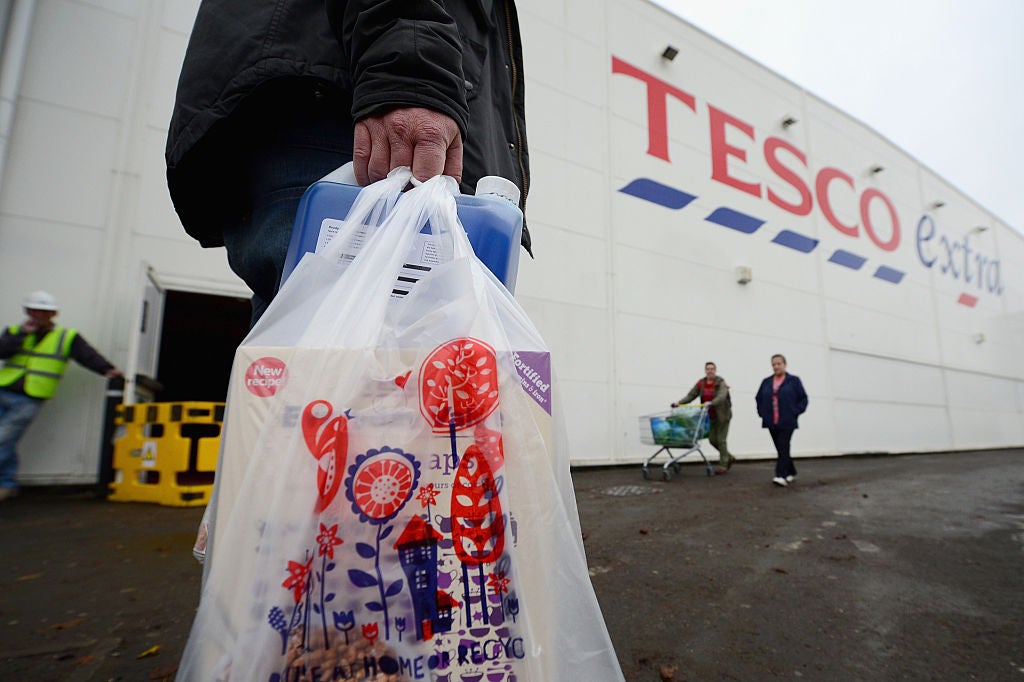The Independent's journalism is supported by our readers. When you purchase through links on our site, we may earn commission.
Tesco cuts 20 million plastic items from its Christmas range
In a bid to tackle plastic waste, the retailer will remove certain items from its shelves

Your support helps us to tell the story
From reproductive rights to climate change to Big Tech, The Independent is on the ground when the story is developing. Whether it's investigating the financials of Elon Musk's pro-Trump PAC or producing our latest documentary, 'The A Word', which shines a light on the American women fighting for reproductive rights, we know how important it is to parse out the facts from the messaging.
At such a critical moment in US history, we need reporters on the ground. Your donation allows us to keep sending journalists to speak to both sides of the story.
The Independent is trusted by Americans across the entire political spectrum. And unlike many other quality news outlets, we choose not to lock Americans out of our reporting and analysis with paywalls. We believe quality journalism should be available to everyone, paid for by those who can afford it.
Your support makes all the difference.UK supermarket chain Tesco has made a number of recent moves to be more sustainable over the festive period, including ditching 20 million plastic items from its Christmas stock.
Plastic has been reduced on packaging for Christmas puddings, plus crackers and festive lights – 312,000 of which will be sold in recyclable cardboard packaging.
Christmas cards will now be sold in recyclable cardboard boxes, which will save 4.6 million bits of plastic per year, and the decorations on things like greeting cards, wrapping paper and gift items has also been considered – there’ll be no more non-biodegradable glitter.
“It is an absolute priority of ours to remove and reduce the amount of plastic in our stores to the minimum and ensure everything we use is recycled and kept out of the environment,” said Tesco quality director, Sarah Bradbury. “Christmas time is no exception and we want to do our bit to help customers have more sustainable celebrations.”
The company aims to reduce its plastic footprint significantly in 2020, with targets of removing 1bn pieces of plastic by the end of the year.
As part of its four “Rs" initiative, “removing, reducing, reusing and recycling” it has removed plastic-wrapped multipacks from tinned food like tuna, instead stocking single tins on multibuys deals. It has reduced the size of it crisps packaging and now also reuses all of its returned clothes hangers.
The targets come after Tesco research found three quarters (74 per cent) of shoppers have sustainability in mind when considering what to buy. It found around a third of consumers (32 per cent) only buy loose fruit and veg to avoid plastic waste.
Company research also discovered that the 51 per cent of Brits reuse old Christmas decorations, while a quarter of us reuse wrapping paper.
A new government policy on plastic packaging will see retailers taxed £200 per tonne on packaging that has less than 30 per cent recycled content. The tax will take effect from April 2022.
Since 2015, large retailers in England are required to charge 5p for plastic bags, and the government initiative has vastly reduced the amount of plastic bags we buy.
It’s estimated people used an average of 140 bags per person per year in 2014, before the charge was introduced, and this reduced to 19 bags per person in 2017-2018.
According to government reports, Tesco’s plastic carrier bag use almost halved from 637 million bags in 2016-2017, to 333 million bags in 2017-2018.
Tesco has announced that it plans to hit net zero in the UK by the year 2035, green initiatives have included fitting 60 UK stores with solar panels.
Iceland announced in 2018 that it would aim to become the world's first mainstream retailer to remove all plastic packaging from its own label products by 2023, it has already saved 850 tonnes of plastic so far.
"It's an issue we care deeply about," said Iceland managing director Richard Walker, who claimed his company’s research proves "UK consumers believe supermarkets need to make changes in the way they package food and the materials used". One way Iceland is doing this is by switching to paper-based trays and a has recently released a plastic-free Christmas range.
Walker has criticised other retailers for not being transparent in reporting their plastic use. "Consumers have a right to know the entire plastic packaging footprint of big businesses," he wrote on Twitter.
Waitrose and John Lewis this year vowed to stop selling Christmas crackers with plastic toys.
Approximately 12 million tonnes of plastic reaches the world's oceans every year, having a deadly effect on marine ecosystems due to the toxins released from plastics as they break down. These toxins reenter our food chain via seafood.


Join our commenting forum
Join thought-provoking conversations, follow other Independent readers and see their replies
Comments